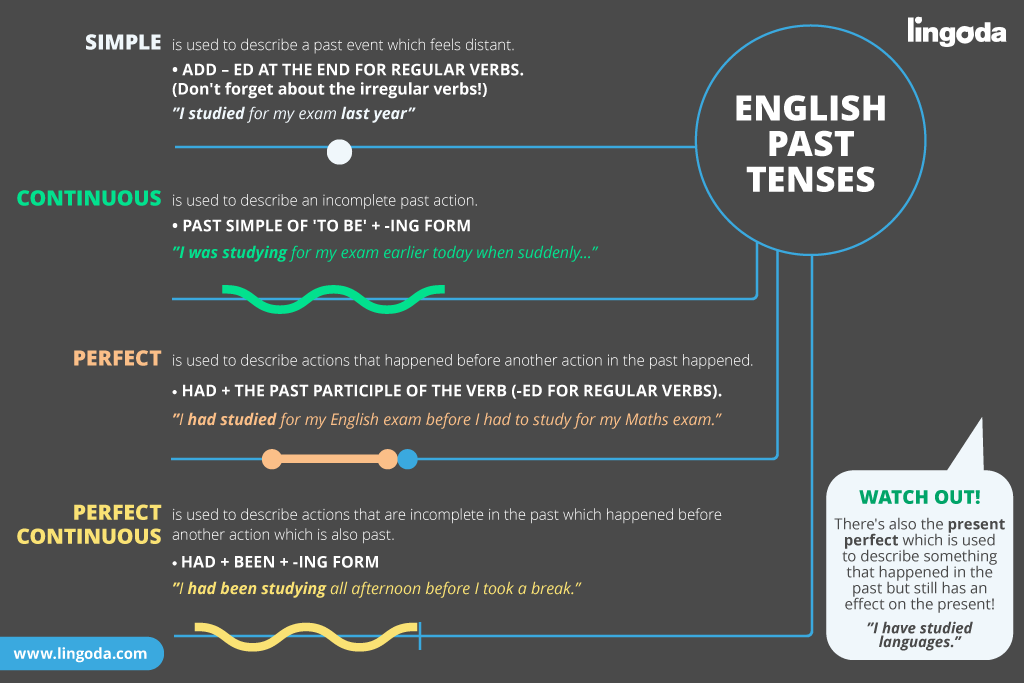by Laura Jones
Updated on January 9, 2024
Have you ever been desperate to tell people about your latest holiday but didn’t know how? The past tense can be a tricky one to master. You don’t want to confuse people by thinking you’re off on a whirlwind adventure to Nepal when actually you were there three weeks ago.
To make it easier for you, we have compiled a list of five easy steps to help you master the past tenses in English.
Unless you’re lucky and you’re a native English speaker, you need to learn the grammatical structure of past tenses. (Actually, a few native speakers could do with a refresher course too.)
The four main past tenses are past simple, past continuous, past perfect, and past perfect continuous.
In order to use them, you need to know how they are formed and what they do. Once you know this, do a few exercises and then take your skills out into the wild. Just like that.
Let’s be honest, doing thousands of gap fills can’t replace real-life practice, so don’t overdo it.
| Name of tense | Structure | When we use it | Example |
| Past simple | Subject + past simple | For finished actions in the past | They ate all the apples. |
| Past continuous | Subject + was/were + ing | For longer actions in the past; for background information | I was eating dinner when the phone rang. |
| Past perfect | Subject + had + past participle | For events that were completed before another event in the past | John had seen Mary before the meeting. |
| Past perfect continuous | Subject + had been + ing | For continuous actions which were completed in the past | We had been living in the UK for 2 years before we moved to Germany. |

If you’re a visual learner, picturing past tenses can help.
‘When I arrived at the station, the train had already left’.
Paint the phrase ‘the train had left’ into the smoke coming from the disappearing train’s chimney. Picture yourself, bursting hot and sweaty onto the platform, staring regretfully at the train: ‘I arrived’ in a comic book-style speech bubble.
‘Last week, I drove out into the desert. I had been driving all day and I was starving when suddenly, McDonald’s appeared on the horizon.’
Imagine ‘I had been driving all day’ written in the endless desert soil. And then, BANG! Out of nowhere, interrupting your drive pops a McDonald’s. Heaven, surely.
Learning endless lists of irregular verbs is useless if you don’t have a sentence to put them in. Plus, chanting ‘see, saw, seen’ isn’t anyone’s idea of a fun night in.
Thinking about a situation when you would use the verb is much better: ‘I saw Dave yesterday and he had just seen Taylor Swift coming out of Tesco.’ Alright, so Taylor Swift isn’t likely to be heading out of your local supermarket, but you get what I mean.
Or: ‘First I ate just one piece of cake. Then I ate another. And another. Before I knew it, I had eaten the entire cake all to myself.’ Sound a bit more familiar?
Books and articles, even blogs, are often written in the past tense, all providing great practice. Reading puts grammar into context and is one of the best ways to imprint grammatical structures on your mind.
You can then recycle the structures and make them your own.
Look at this quote from Alice’s Adventures in Wonderland: ‘Alice asked the Cheshire Cat, who was sitting in a tree, “What road do I take?”’.
Not that useful in real life. But replace a few words and you have, ‘I asked this guy, who was sitting by the bar, “What wine do you recommend?”’. A past simple tense with the past continuous for some background information. Well done you.
In the end, the only way you’re actually going to master the past tenses is by using them. And, yes, by making mistakes. So speak.
Your teachers don’t ask you what you did at the weekend to be nosy. They ask because they want you to use past tenses to describe an experience.
Even if all you did was binge-watch your favorite show on TV, describe an episode: ‘Rachel had been dating Ross for ages, but then they were on a break…’. Teachers are great listeners.
So go ahead, lie down on our metaphorical couch and tell us about your past, mistakes and all.
Embarking on the journey of learning a language means you will face both easier and more challenging obstacles. Past tenses in English might be a little harder to grasp if you are not a native, but thanks to these five tips, you will be ready to leave your fear behind and master their use.
